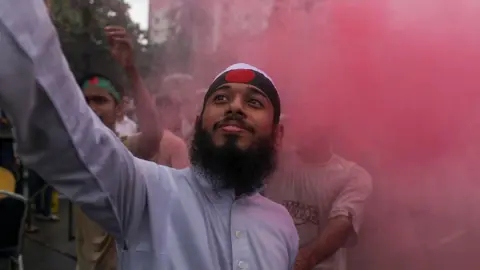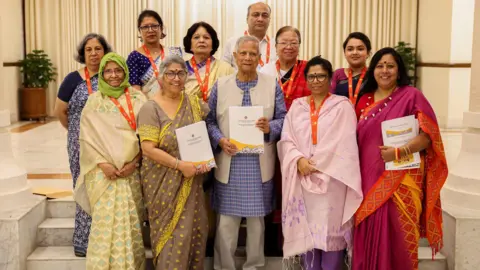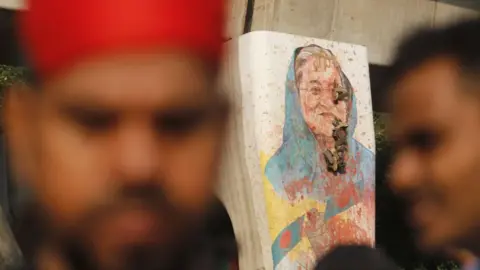Country faces a rocky road to election

South Asia regional editor
 NurPhoto via Getty Images
NurPhoto via Getty ImagesThousands of people gathered in central Dhaka this week celebrating the anniversary of the downfall of Prime Minister Sheikh Hasina and the promise of a new future for the country.
In the pouring rain, the head of the interim government, Muhammad Yunus, leaders of various political parties and activists stood united as they unveiled plans for a “New Bangladesh”.
Across the country, people waved the national flag in concerts, rallies and special prayer sessions marking what some activists are calling the “second liberation” of this Muslim-majority nation of 170 million people.
But these jubilant scenes did not tell the whole story in the last 12 months.
Rights groups say there have been instances of lynching, mob violence, revenge attacks, and a resurgence of religious extremism which threaten to derail the country’s journey towards democracy.
Meanwhile, the ex-prime minister who was so spectacularly pushed from power watches from the sidelines of exile in neighbouring India, denying her role in the deadly crackdown and refusing to return to face charges that amount to crimes against humanity.
“I think we had a regime change, not a revolution. Fundamentally, misogyny remains intact, male dominance remains unchallenged,” Shireen Huq, a women’s rights activist, tells the BBC.
Ms Huq headed the Women’s Affairs Reform Commission, one of the bodies set up by the interim government to bring social and political changes reflecting the uprising’s goals of democracy and pluralism.
In April this year, the 10-member body submitted its report calling for gender equality – particularly over women’s right to inheritance and to divorce, called for criminalising marital rape and protecting the rights of sex workers, who face abuse and harassment from police and others.
The next month, thousands of Islamist hardliners took to the streets against the proposed recommendations, saying they were anti-Islamic and that “men and women can never be equal”.
The protesters – led by Hefazat-e-Islam, which has a representative on the interim government’s cabinet of advisers – demanded the disbanding of the women’s commission, and its members punished for making those proposals.
Subsequently, no detailed public debate was held on the commission’s proposals.
“I was disappointed that the interim government did not support us enough when we were subjected to lots of abuses by Hefazat-e-Islam,” Ms Huq says.
Yunus’s office did not respond to a request for comment on the allegation.
 Nayem Ali/ CA Press Wing
Nayem Ali/ CA Press WingActivists say the protests were just one example of how the hardliners – who had been pushed to the fringes during Hasina’s tenure – had become emboldened.
They have also objected to girls playing football matches in some parts of the country, women celebrities participating in commercial promotional events, and, in some instances, have harassed women in public places because of how they were dressed.
But it is not just women who have borne the brunt. Hardliners have also vandalised scores of shrines of minorities like the Sufi Muslims in the past year.
But, even as people like Ms Huq look to the future, Bangladesh is still confronting its past.
There’s a groundswell of anger against Hasina’s Awami League-led government, which is accused of unlawful killings, enforced disappearances, and brutal suppression of dissent.
“You have a huge constituency of people in Bangladesh who wanted to see not just accountability but vengeance and retribution,” says David Bergman, a journalist and a long-time Bangladesh watcher.
However, he says, “one can’t continue with the injustices that existed in the Awami League period and just replicate them in the current period”.
But that is what Hasina’s Awami League claims is happening. It says hundreds of its supporters have been lynched over the past year – allegations the interim government denies.
Several journalists and supporters of the Awami League have been jailed for months on murder charges. Their bail applications have been repeatedly rejected by courts.
Critics say there is no thorough investigation over those murder accusations, and they have been kept in detention only because of their previous support for the Awami League.
 NurPhoto via Getty Images
NurPhoto via Getty Images“It takes time for stability to return after a major uprising. We are in a transitional phase,” acknowledged Nahid Islam, a student leader who helped spearhead the protests and acted as an adviser to the interim government until recently.
Islam agrees there are challenges facing the country, but dismisses concerns of growing Islamist influence, saying it was “part of a broader cultural struggle” that has existed for years.
But there are also signs of progress. Many credit the interim government with stabilising the country’s economy and, contrary to fears, the banking sector has survived.
Bangladesh has met its loan obligations, kept food prices largely stable, and maintained robust foreign exchange reserves – currently at $30bn (£22bn) – thanks to remittances and international loans. Exports have also held steady.
Then there are other, less easily measurable things.
Islam argues that, since the fall of Hasina, “a democratic environment has been established, and now everyone can express their views freely”. That is something to be celebrated in a country shaped by a history of political turbulence, military coups, assassinations, and bitter rivalries.
But that is being questioned by some.
The influence of student leaders over the interim government has drawn criticism. They were given the roles in recognition for their leadership in the unprecedented protests which toppled Hasina.
Today, two remain in the cabinet, and critics say some controversial decisions, such as the temporary ban on the Awami League, were made under student pressure.
“The government has at times complied with some of the populist demands, particularly by the students, fearing more threatening protests could otherwise erupt. However, that was the exception rather than the rule,” Mr Bergman says.
Meanwhile, an exiled leader from the Awami League alleges that the party’s supporters are being silenced by not being allowed to contest the next poll – with most of its leaders in exile or in prison.
“The elections will not be inclusive without the participation of the Awami League,” Mohammad Ali Arafat, former minister in Hasina’s cabinet, tells the BBC.
In its latest report, the Transparency International Bangladesh (TIB) said there had been an alarming rise in mob violence while extra-judicial killings and deaths in custody had persisted in the past year.
“We have overthrown an authoritarian regime, but unless we put an end to the authoritarian practices, we cannot really create a new Bangladesh,” Iftekhar Zaman, the executive director of the TIB, said during the launch of the report earlier this week.
As Bangladesh stands at a crossroads, the next six months will be critical.
Some argue that, if there are no meaningful changes to the chequered political system, the sacrifices of those killed in the uprising could be rendered meaningless.
https://ichef.bbci.co.uk/news/1024/branded_news/b191/live/900a88a0-743a-11f0-876e-092c0a90f4e0.jpg
2025-08-10 01:52:02






